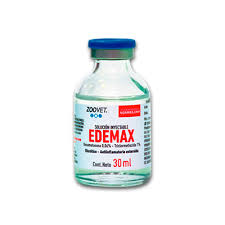Edemax
Dosage and Administration:
Veterinary Supervision: Edemax injection should only be administered under the guidance of a veterinarian. The dosage depends on the animal’s condition, size, and species.
Route: It is typically given by intravenous (IV) or intramuscular (IM) injection to ensure rapid onset of diuretic action.
Frequency: The frequency of administration can vary depending on the severity of the fluid retention and the response to the drug. It may be given once or in repeated doses.
Mechanism of Action:
Furosemide in Edemax works by inhibiting the reabsorption of sodium and chloride in the kidney, leading to an increase in the production of urine.
This reduces the fluid load in the body, alleviating conditions related to fluid overload, such as heart failure and edema.
Side Effects:
Dehydration: Since Edemax increases urine production, there is a risk of dehydration, especially if water intake is not monitored.
Electrolyte Imbalance: Prolonged use can lead to an imbalance in electrolytes such as sodium, potassium, and magnesium, which are critical for various bodily functions.
Hypokalemia: Low potassium levels (hypokalemia) are a common side effect of diuretics like furosemide, which can lead to muscle weakness, cramps, or more severe cardiac issues.
Kidney Function: In rare cases, excessive use of furosemide can impair kidney function, leading to acute kidney injury if not monitored.
Hypotension: If too much fluid is removed, it can cause low blood pressure (hypotension), leading to dizziness, weakness, or fainting.
Contraindications:
Dehydrated Animals: Edemax should not be given to animals that are already dehydrated or have an existing electrolyte imbalance.
Kidney Disease: In animals with severe kidney disease, Edemax should be used with caution, as it can exacerbate kidney dysfunction.
Sensitivity: Animals with a known allergy or sensitivity to furosemide should not be given Edemax.
Monitoring:
Animals receiving Edemax should be monitored for signs of dehydration, electrolyte imbalance, and changes in kidney function.
Regular blood tests may be required to check electrolyte levels, especially if the treatment is long-term or the dosage is high.
Interactions:
NSAIDs: Nonsteroidal anti-inflammatory drugs (NSAIDs) can reduce the effectiveness of furosemide by interfering with its action in the kidneys.
Other Diuretics: Combining Edemax with other diuretics can increase the risk of severe electrolyte imbalances or dehydration.
ACE Inhibitors: The combination of furosemide with ACE inhibitors (often used in heart failure management) requires careful monitoring to avoid excessive drops in blood pressure.
Edemax Injection is a potent diuretic solution used in veterinary medicine to manage conditions associated with fluid retention, such as edema, pulmonary edema, and heart failure. While it is highly effective in removing excess fluid from the body,
it must be used with caution under veterinary supervision to avoid side effects like dehydration, electrolyte imbalance, and kidney issues. Regular monitoring of the animal’s condition and blood chemistry is crucial to ensure the safe and effective use of Edemax.
Edemax Injection
Active Ingredients:
The active component in Edemax is typically furosemide, a potent loop diuretic that works by acting on the kidneys to remove excess fluid.
Furosemide prevents sodium, chloride, and water from being reabsorbed in the kidney’s loop of Henle, leading to increased urine production.
Uses of Edemax Injection:
Edema Management: It is commonly used to reduce swelling caused by excess fluid retention in tissues, which can occur due to heart failure, liver disease, or kidney disease.
Respiratory Conditions: In horses, Edemax is sometimes administered to reduce pulmonary edema (fluid in the lungs), which can impair breathing.
Congestive Heart Failure: The injection can relieve symptoms of heart failure by reducing fluid buildup in the lungs (pulmonary edema) or other parts of the body.
Ascites: It can also be used to treat ascites, the accumulation of fluid in the abdominal cavity, often associated with liver disease.
Hypertension: In some cases, furosemide can help control high blood pressure by reducing blood volume through diuresis.
Edemax Injection is a veterinary product primarily used for its diuretic effects to treat conditions associated with fluid retention or edema (abnormal accumulation of fluid in tissues or cavities) in animals. Diuretics help to eliminate excess fluid by increasing urine production, thus reducing fluid buildup in the body.




Reviews
There are no reviews yet.